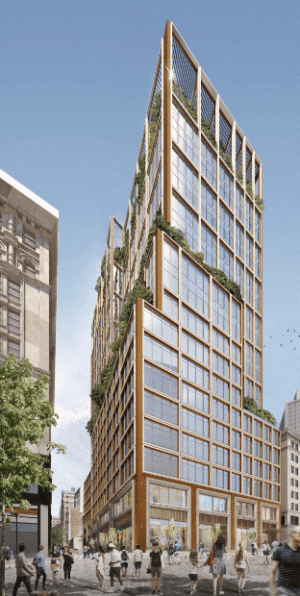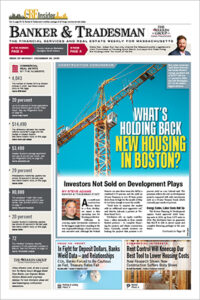
Midwood Global's proposed 11-21 Bromfield St. project has been undergoing city review for several years. Image courtesy of Adrian Smith + Gordon Gill Architecture and Arrowstreet
Development proposals with serious flaws would receive early notification from Boston officials under proposed changes to the Article 80 zoning code.
In the biggest changes to development reviews since the 1990s, the Article 80 modernization proposal includes a new three-step process designed to weed out proposals that don’t meet the city’s goals.
The Boston Planning Department released its final version of the changes this week, and is seeking comments through Nov. 20. Article 80 applies to projects 20,000 square feet or larger, or include at least 15 housing units.
Kairos Shen, who was named Chief of Planning this week by Mayor Michelle Wu, is a member of the Article 80 Modernization Steering Committee which issued the final recommendations this week after two years of meetings.
The new large project review requires developers to submit preliminary designs to city staff and residents before submitting detailed schematic designs.
Inadequate proposals would be given a “clear and early ‘no’” before proceeding to the detailed design phase, according to the document.
Under the current system, developers submit detailed project notification forms and present plans to impact advisory groups (IAG’s), consisting of appointed neighborhood residents and community group representatives.
Some projects remain in the IAG process for years without being placed on the BPDA board agenda for an up-or-down vote. Midwood Investment & Development’s proposed 11-21 Bromfield St. office tower has been under review since October 2020.
The proposal also would replace IAG’s, which review individual projects, with community advisory teams reviewing multiple projects in a neighborhood.
The document is the outcome of the Wu administration’s push to reform Article 80, the ground rules which cover most developments since the 1990s. It sought to fix a “lengthy, opaque and unpredictable” process that favored savvy developers, consultants and community groups that demand benefits.
The Planning Department has scheduled a pair of virtual public meetings on Oct. 23 and Oct. 26 to present the final plan, before it proceeds to the BPDA board and Zoning Commission.
During her annual speech to the Greater Boston Chamber of Commerce on Wednesday, Wu said one of the most frequent pieces of feedback she’s gotten from developers is that “early ‘no'” can be valuable.
“We heard loud and clear that a fast ‘no,’ is better than an endless series of ‘maybes,'” she said.
Wu did not commit to setting deadlines by which city staff would complete their review of Article 80-elligble projects, but told business leaders that “with these changes, we’re confident we can add predictability, and cut time and expense” and said the city has already sliced approval times of affordable housing projects by one-third over the pre-pandemic baseline and hopes to get that down to half the time by the middle of next year.
The other big change to the Article 80 process recommended in the committee’s report: a standardization of community benefits packages. While the practice has come under criticism from some housing and zoning reform advocates, Wu told Chamber members Wednesday that such packages were still important to voters.
“Communities want to know that they’re getting a good deal from growth in our neighborhoods, and developers want to put the costs in their pro formas well in advance,” she said.
The Article 80 changes also come as the city is trying to digitize and speed up the inspections that are part of constructing buildings.
Banker & Tradesman staff writer James Sanna contributed to this report.








